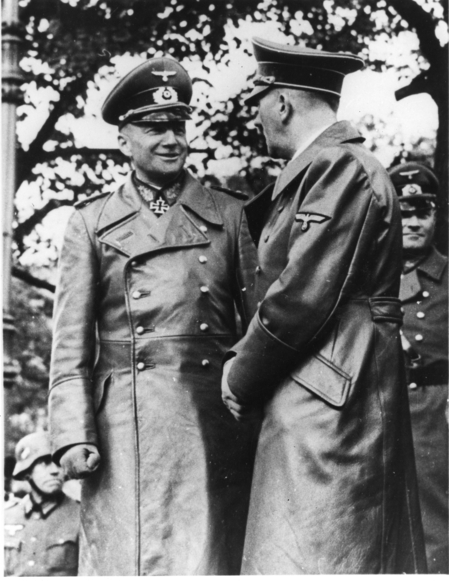Sunday 5 November 1939
 |
| Von Brauchitsch and Hitler roughly around their 5 November 1939 meeting. |
Every senior commander in the Wehrmacht is certain that now is not the right moment to attack France (Operation "Fall Gelb") due to several reasons, including the weather and the state of the military. Von Brauchitsch's mission is to dissuade the Fuhrer from any offensive plans for the time being, and also, in a larger sense, re-establish the Army's traditional role in decision-making. Fall Gelb is still planned for 12 November, so there is no more time to waste. Von Brauchitsch drafts a memorandum for Hitler outlining his points, and also gives an oral presentation to emphasize the seriousness of the situation.
As the core of his argument, von Brauchitsch states that the infantry had lacked fighting spirit in Poland. The troops were undisciplined and there had been mutinies against officers. The army, he said, could not be relied upon without further training, which would require time.
Hitler is furious and explodes into a rage. As a former front-line soldier, he believes that he knows about soldier morale. As he later states, he believes the German soldier is the best in the world and of better character than the Generals. He does, however, keep the memorandum and read it later, calling it a "pack of lies." Hitler angrily dictates an order dismissing von Brauchitsch, but his aide General Keitel dissuades him from issuing it on the grounds that there is no suitable successor.
Von Brauchitsch does achieve his main goal. Fall Gelb is postponed again. The meeting, however, irreparably damages Hitler's relations with his Generals. He inherently sympathizes with the "grunts" and not the "swivel chair cowards," and this incident reawakens those dormant prejudices. He refers to the sorts of arguments made by von Brauchitsch, which he considers defeatist, as "the spirit of Zossen" (Heer headquarters south of Berlin). Von Brauchitsch later offers his resignation, but Hitler cools down and refuses it because he has established his authority and von Brauchitsch has been cowed - which makes him compliant. This is perhaps the first real illustration of Hitler's ability to completely destroy the self-confidence of an Army General.
Some accounts call von Brauchitsch the leader of the "Zossen conspiracy" and so forth. There indeed was wild talk behind the scenes - but there was throughout the war. These accounts state that von Brauchitsch went to the meeting with the objective of either getting the Fuhrer to agree with him or shooting/arresting him. However, since neither happened (at least at the meeting), those claims appear to be false or wishful thinking. There is no indication that a putsch was ever on von Brauchitsch's mind that day.
German Conspirators: In the only actual action taken by the "Zossen conspiracy," Colonel Hans Oster of the German Military Intelligence (the Abwehr) warns a Dutch military attaché in London, Colonel Sas, of Hitler's plans. Sas, in turn, informs the Belgian attaché. Hans Oster is considered a leader of the "opposition" by those in the know.
Battle of the Atlantic: Germany lodges a protest against the treatment of the detained prize crew and release of the City of Flint. The protest is rejected. The ship itself reaches Bergen to unload its cargo.
The British at Weymouth detain the US freighter Black Condor, while in the Orkneys they detain the Scanmail. They release the freighter Black Eagle.
The Kriegsmarine recalls the Deutschland from its raid in the North Atlantic.
Royal Navy aircraft carrier Ark Royal captures the German vessel Uhenfels.
British Government: Winston Churchill, in Paris, meets with Lord Gort, in charge of the BEF force.
Sweden: the Swedish government protests the German mining of waters only three miles from the Swedish coast.
Finland: Negotiations adjourn as the Finns consider their options.
 |
| Winston Churchill meets with Lord Gort in Paris, 5 November 1939. |
November 1939
November 1, 1939: The Jet Flies AgainNovember 2, 1939: The Soviets Devour Poland
November 3, 1939: Amending the Neutrality Act
November 4, 1939: Roosevelt Signs Neutrality Laws
November 5, 1939: The Spirit of Zossen
November 6, 1939: First Dogfight
November 7, 1939: More Lies About SS Athenia
November 8, 1939: Hitler Almost Killed
November 9, 1939: The Venlo Incident
November 10, 1939: Dutch Panic
November 11, 1939: Poignant Armistice Day
November 12, 1939: Peace Efforts Made and Rejected
November 13, 1939: First Bombing of Great Britain
November 14, 1939: The Dyle Plan
November 15, 1939: Elser Confesses to the Bürgerbräukeller Bombing
November 16, 1939: Martial Law in Prague
November 17, 1939: International Students Day
November 18, 1939: Magnetic Mines
November 19, 1939: Walls Around the Warsaw Ghetto
November 20, 1939: First RN Submarine Victory
November 21, 1939: Salmon & Gluckstein on the Prowl
November 22, 1939: British Recover A Magnetic Mine
November 23, 1939: HMS Rawalpindi Sunk
November 24, 1939: Japanese Enter Nanning
November 25, 1939: The Olympics are a War Casualty
November 26, 1939: Soviets Stage an "Incident" at Mainila
November 27, 1939: German Marriage Becomes Perilous
November 28, 1939: Judenrats in Poland
November 29, 1939: The Soviets Prepare to Invade Finland
November 30, 1939: Winter War Begins
2019
No comments:
Post a Comment